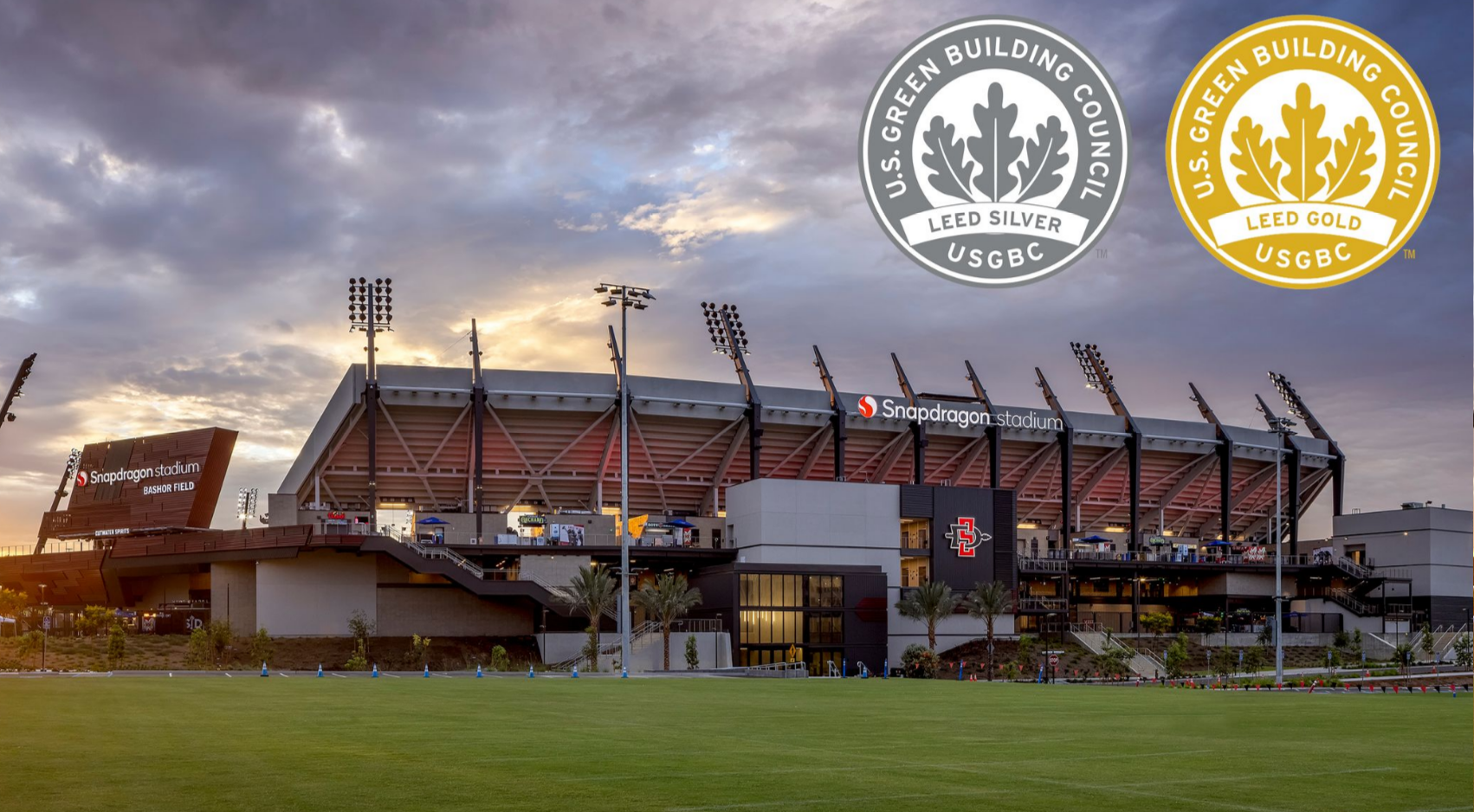SDSU Mission Valley Leads the Way in Sustainability
Snapdragon Stadium and SDSU Mission Valley have been awarded LEED Gold and Silver certifications.

San Diego State University has announced that Snapdragon Stadium and SDSU Mission Valley have both been awarded Leadership in Energy and Environmental Design (LEED) certifications from the U.S. Green Building Council (USGBC).
Snapdragon Stadium has been awarded the globally-recognized LEED Gold certification for implementing practical and measurable strategies and solutions in areas including sustainable site development, water savings, energy efficiency, materials selection and indoor environmental quality.
"We are proud to be recognized with a LEED Gold certification," said SDSU Director of Athletics John David Wicker. "We've always said we're building a stadium for the community and to reach LEED Gold status shows that we are doing it the right way. It is important that the athletic department assist the university in meeting its sustainability goals and align with the university’s climate action plan."
As part of SDSU’s commitment to sustainability, Snapdragon Stadium was designed with a variety of green features and to achieve strict benchmarks, including:
- a 40% reduction in potable water usage and a 55% reduction in outdoor water usage compared to the LEED baseline
- on-site photovoltaic (PV) technologies generating 15% of the total demand of electricity
- vegetation for 25% of the outdoor space and outdoor surfaces constructed with light-colored materials to reflect sunlight and mitigate the heat island effect
- a light pollution reduction strategy to obey night-sky ordinances
SDSU Mission Valley achieved LEED Neighborhood Development (ND) Silver certification for being designed and built with sustainable strategies, receiving its highest marks for designing pedestrian and bike-friendly streets in a transit-oriented neighborhood and green buildings with several housing types, including 460 units of affordable housing that will include an on-site child care facility for preschool and Pre-K children.
“Sustainability is at the heart of SDSU Mission Valley,” said SDSU President Adela de la Torre.
“By creating a mixed-use neighborhood that mitigates the effects of cars, and prioritizes pedestrian-oriented design, there will be positive economic, health, and environmental outcomes for all the people who will live, work, and visit our campus.”
At SDSU Mission Valley, many major streets and pathways are lined with shade trees and other natural amenities to create a more inviting pedestrian environment. The on-site trolley station will also minimize vehicular pollution and traffic impacts in the vicinity by allowing pedestrians to easily travel to SDSU’s College Area campus three trolley stops away, to downtown San Diego, and to several other regional transit connections.
Adjacent neighborhoods will also benefit from the development of approximately 80 acres of park and open space, which will create an environment that supports active lifestyles and improves access to exercise.
In addition to the thoughtful site planning, both certifications recognized the sustainable construction methods including recycling 90% of the former stadium and parking lot, which was diverted from the landfill and included 200,000 tons of concrete. The materials are being reused on-site for hardscape, road base and fill.
Clark Construction, general contractor for both the stadium and site improvements, is one of the nation’s top green builders, with more than 500 sustainably certified projects completed.
“This is validation of the university's commitment to sustainability, and it confirms the positive impact SDSU Mission Valley and Snapdragon Stadium will have on the greater San Diego community,” said Carlos Gonzalez, Division President of Clark Construction. “We are delighted to be a partner with the university, Gensler's designers and a world-class team of engineers and specialty trade partners, all of whom are committed to USGBC's mission ‘to transform how buildings and communities are designed, built and operated, enabling an environmentally and socially responsible, healthy, and prosperous environment that improves the quality of life.’"
LEED certification is considered the industry standard in defining and measuring “green,” sustainable construction and has been an important influence on the development of SDSU Mission Valley. Through sustainable design, construction and operations, LEED acknowledges the university’s work to increase its climate resiliency, manage and reduce carbon emissions, and improve student and resident health through green initiatives. To qualify for certification from the USGBC, each project must follow strict LEED guidelines.
Sustainability is one of the university’s strategic priorities. SDSU’s Office of Energy & Sustainability is currently updating the university’s Climate Action Plan with input from the university community.
"Snapdragon Stadium joins other newly constructed and retrofitted SDSU buildings in obtaining LEED certification," said Kristin Larson, Director of Energy & Sustainability. "SDSU recently achieved Platinum status for the renovated Aztec Recreation Center and is continuing to pursue Double Platinum status for that facility. If successful, it will join the Aztec Student Union in having achieved LEED Double Platinum status at SDSU."
Continuing SDSU’s commitment to achieving a sustainable future and following the lead of SDSU Mission Valley, all of the developers selected to begin the first phase of vertical development will pursue sustainable certifications. Chelsea Investment Corporation will develop the first affordable housing project and has identified a path to achieve LEED Gold Certification incorporating strategies to increase efficiency, optimize systems, and expedite compliance with green building codes and certification program requirements.
AvalonBay will complete the first round of residential and retail development, which is being designed to achieve LEED Gold Certification. LPC West, selected to complete the first innovation district project, will seek a minimum of LEED Silver by prioritizing water conservation, energy efficiency, and carbon reduction as well as integrating mass timber; a renewable building material that is better for the environment.
For more information about SDSU Mission Valley, visit https://missionvalley.sdsu.edu or follow us on Instagram, Facebook, and Twitter. For more on the university’s overall sustainability efforts, visit https://sustainable.sdsu.edu. For more information on LEED, visit www.usgbc.org.



